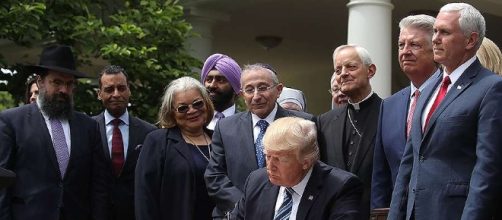US President Donald Trump has signed an executive order allowing churches and other religious bodies to be more actively involved in political activities.
The order was signed during a ceremony in the White House Rose Garden. The documents instruct the Internal IRS not to take severe measures against churches and other religious bodies that are exempted from tax and wish to participate in active politics.
The expanded executive order
Religious leaders such as pastors are already allowed to give political speeches. All tax-exempt organizations are restricted from endorsing or opposing political candidates as provided in the 1954 Johnson Amendment, but the new executive order signed by the President clearly explains that those restrictions will remain.
The law restricts the IRS from preventing religious groups on political activity; it specifically gives regulatory relief for bodies that object on a religious basis to what is provided in Obamacare which mandates the employers to provide some health services, including health coverage for contraception.
“For the fact that Religious Freedom is enshrined I believe is a bold step by the administration,” Russell Moore of the Evangelical Church said.
Trump's speech
Trump said on Thursday during the ceremony that the order would stop religious organization being singled out for their political views and affiliations.
“We won’t allow people to be targeted, bullied, intimidated or silenced anymore because of their faith.” President Trump declared during the National Day of Prayer ceremony.
“And will never support or allow religious discrimination of any sort,” he added.
Trump’s statement is contrary to certain moves his administration has taken to prevent Muslims from some countries entry to the United States. His Presidential Election campaign vowed to stop all Muslims from traveling to the US, which the court has placed his executive orders on the Muslim ban on hold.
Trump admonished that the 1954 Johnson Amendment selectively targeted pastor, priests, and imams. But the latter would be free to engage in political activity if they wish under his new executive order.
The restricted law
The Johnson amendment of 1954, states that any tax-exempt organization may lose its exemption if found to have endorsed or opposed to a candidate for a political position.
The IRS is empowered to investigate and fine defaulters of the law officially. Since the inception of the law about six decades ago, only one organization has been found guilty of the law and has therefore lost its exemption as a result of IRS implementation of the amendment.


